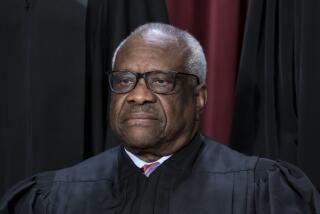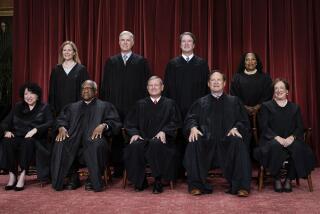2 Advocacy Groups Oppose Thomas; Third Backs Him : Judiciary: Rights, women’s organizations reject court nominee. Activists tied to White House declare support.
WASHINGTON — The public battle over the confirmation of Supreme Court nominee Clarence Thomas intensified Tuesday, with two national advocacy groups voicing their opposition and a White House-backed women’s organization declaring its support for the conservative black jurist.
The announcements came as leaders of the National Assn. for the Advancement of Colored People prepared to reveal its position today, and the AFL-CIO high command, meeting in Chicago, was expected to come out against Thomas.
According to a report in today’s editions of the New York Times, the NAACP staff has prepared a report strongly criticizing Thomas for his opposition to affirmative action and his record on civil rights enforcement. The paper quoted NAACP board members as predicting that the organization would oppose the nomination.
In Tuesday’s developments, President Bush’s nominee drew the opposition of People for the American Way, a civil rights watchdog group that played a role in the 1987 defeat of Robert H. Bork’s nomination to the high court.
The organization noted that Thomas’ rise from poverty and segregation to his seat on the U.S. Court of Appeals for the District of Columbia was a remarkable achievement. But it said that his record as a public official and his writings provide a different impression.
“We discover a man with a singular disrespect for the rule of law, an apparent indifference to fundamental civil liberties, contempt for Congress and the judiciary and a painfully cramped view of government’s role in repairing the damage of discrimination,” Arthur Kropp, president of the organization, said at a news conference.
A similar assessment was made by the Women’s Legal Defense Fund, a 20-year-old women’s right advocacy organization that said it also would urge the Senate to reject Thomas as a replacement for retiring Supreme Court Justice Thurgood Marshall.
“Our report reveals a nominee who does not care about the everyday problems of working people who need to live and work free of discrimination,” said Judith Lichtman, president of the organization.
She said that Thomas once praised a “truly outrageous analysis by economist Thomas Sowell that said women prefer jobs that pay less.”
A different perspective was offered by Labor Secretary Lynn Martin and other prominent Bush Administration officials participating in a newly organized “Women for Thomas” group formed with the aid of Sheila Tate, Bush’s campaign spokeswoman in 1988.
Describing Thomas as a “fair, equitable and compassionate individual,” Martin said that he compiled an outstanding record as chairman of the Equal Employment Opportunity Commission, a position he held before joining the appellate court.
Opponents contend that Thomas would accelerate a move to the right by the Supreme Court and could provide the deciding vote on whether to overturn the 1973 decision that legalized abortions as well as other landmark civil rights decisions.
Supporters, however, insist that Thomas would be an independent justice, arguing that he should not be required to pass a “litmus test” devised by special interest groups in order to win Senate confirmation.
Labor sources said that the AFL-CIO executive council, the governing body of the labor federation, would soon declare its opposition, partly because of Thomas’ past criticism of the minimum wage, collective bargaining laws and a broad social role for government.
Along with the NAACP, the AFL-CIO was important in helping defeat Bork in 1987 as well as two of President Richard M. Nixon’s Supreme Court nominees, Clement F. Haynsworth in 1969 and G. Harrold Carswell in 1970.
Delegates to the NAACP’s annual convention in early July were divided over the nomination, and the civil rights organization postponed a decision on whether to support or oppose Thomas until it completed its own study of his record. It is expected to disclose its decision today. One local chapter, the Compton, Calif., branch of the NAACP, has announced that it supported the nomination.
So far, the Congressional Black Caucus is the only black organization to actively oppose Thomas. The National Urban League said this month that it would remain neutral in the confirmation fight.
More to Read
Sign up for Essential California
The most important California stories and recommendations in your inbox every morning.
You may occasionally receive promotional content from the Los Angeles Times.










